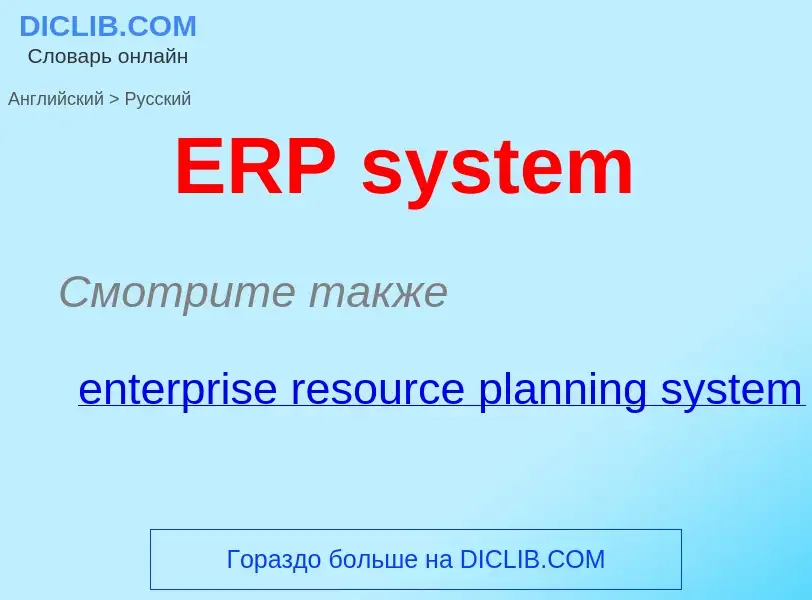Traduzione e analisi delle parole tramite l'intelligenza artificiale ChatGPT
In questa pagina puoi ottenere un'analisi dettagliata di una parola o frase, prodotta utilizzando la migliore tecnologia di intelligenza artificiale fino ad oggi:
- come viene usata la parola
- frequenza di utilizzo
- è usato più spesso nel discorso orale o scritto
- opzioni di traduzione delle parole
- esempi di utilizzo (varie frasi con traduzione)
- etimologia
ERP system - traduzione in Inglese
Смотрите также
общая лексика
ERP система планирования бизнес-ресурсов
ERP-система (программное обеспечение, используемое для идентификации и планирования ресурсов организации, необходимых для принятия, изготовления, отгрузки и учета заказов клиентов; представляет собой набор интегрированных приложений, которые в едином информационном пространстве поддерживают все основные аспекты управленческой деятельности предприятий - планирование ресурсов (финансовых, человеческих, материальных) для производства товаров (услуг), управление выполнением планов (включая снабжение, сбыт, ведение договоров), все виды учета, анализ результатов хозяйственной деятельности; ERP-системы имеют следующие необходимые характеристики: централизация данных в единой базе, близкий к реальному времени режим работы, сохранение общей модели управления для предприятий любых отраслей, поддержка территориально распределенных структур и др.)
сокращение
ERP system
Смотрите также
Wikipedia

Enterprise resource planning (ERP) is the integrated management of main business processes, often in real time and mediated by software and technology. ERP is usually referred to as a category of business management software—typically a suite of integrated applications—that an organization can use to collect, store, manage and interpret data from many business activities. ERP systems can be local based or cloud-based. Cloud-based applications have grown in recent years due to information being readily available from any location with Internet access. Traditional on-premises ERP systems are now considered legacy technology.
ERP provides an integrated and continuously updated view of core business processes using common databases maintained by a database management system. ERP systems track business resources—cash, raw materials, production capacity—and the status of business commitments: orders, purchase orders, and payroll. The applications that make up the system share data across various departments (manufacturing, purchasing, sales, accounting, etc.) that provide the data. ERP facilitates information flow between all business functions and manages connections to outside stakeholders.
According to Gartner, the global ERP market size is estimated at $35 billion in 2021. Though early ERP systems focused on large enterprises, smaller enterprises increasingly use ERP systems.
The ERP system integrates varied organizational systems and facilitates error-free transactions and production, thereby enhancing the organization's efficiency. However, developing an ERP system differs from traditional system development. ERP systems run on a variety of computer hardware and network configurations, typically using a database as an information repository.


